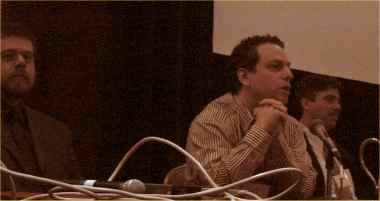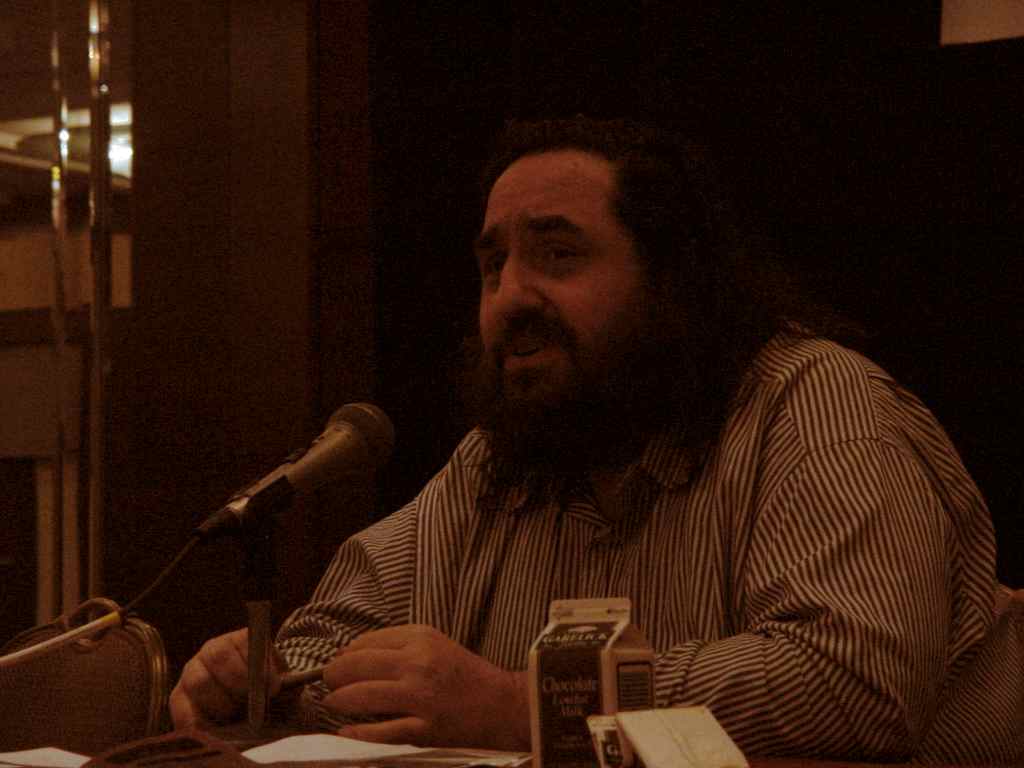Connectivity 2002 – Wednesday Afternoon
Connectivity 2002 – Wednesday Afternoon

Keith, Joe and Lee
Panel: Open Communications Infrastructure: Cutting the Knot. Lee McKnight is talking, Prof. at Tufts. He says, there should be no regulatory distinctions local and national communications, wireline or wireless, narrowband or broadband, broadcast or switched. He’s presenting what he he thinks the new regulatory framework should be.
Keith Weiner, CEO of DiamondWare. He’s here to ruffle our feathers. Keith begins by stating the prevailing theory with which he’ll disagree: In theory we need to reign in the profit-hungry corporations, level the playing field and intervene to manage competition. People here would like to see hundreds of little companies competiting and would like to see the incumbents destroyed. But (now he’s stating his own views) there is no such thing as public interest because (on Ayn Randian grounds) there is no such thing as the public. But under the theory of “public interest,” the Bells are the ones who are delivering because they provide a universal service without tax money. (Fred from the audience says that the Bells don’t do rural delivery and it is subsidized by a tax.) Keith is trying to show equivocation on the word “power” that leads us to think that we need regulation to protect us. Microsoft doesn’t have the same sort of power as the Mafia; you can always go to a competitor. His point (as I understand it in response to a question from me) is that all regulation is bad and is only needed because of prior flaws in the system that prevent markets from being truly open and free; he would roll back the regulation and then attack the more fundamental problems (e.g., courts that favor incumbents with money). … Many ruffled feathers later, Keith wraps up: In a regulated environment, the richest gang wins, so fight against regulation.
[Must type louder to annoy Halley.]
Now Joe Plokin from Bway.net (a NYC ISP) and www.teletruth.org is up. He says we’re not looking at deregulation but demonopolilzation. TeleTruth is a consumer protection and advocacy group within telecommunications.

David Brustein looking more like Fidel
in the photo than he does in person.
Dave Burstein is leading a panel on “The Realities of the Local Access Bandwidth Bottleneck.” He’s reminding us of what’s at stake: our ability to decide what we want to put on the Net at prices we can afford, e.g., a broadcast of a church service. What is it that we want, he asks? The audience answers: Connectivity to be treated like a utility; as many people connected as quickly as possible (that was me).
How do we get there? In politics, you find allies and phrase the issues in their terms. Here are some potential allies:
- Commissioner Kevin Martin at the FCC is a rigid conservative but he loves what the Net can do and doesn’t want parts of the country left out. He wants a better, faster Internet.
- John Chambers and Andy Grove want to sell lots of equipment to do these great things on the Internet. Their TechNet initiative wants to deliver lots of bandwidth.
We can’t get there through a market full of small companies. .. [Damn, I have to duck out for a few minutes…] David is now suggesting various ways of getting cable to just about everyone, including a 30% investment tax credit to the Bells along with requirements that they open it up to other vendors. [Another phone call. I missed the ending. Too bad. It was interesting.]
Categories: Uncategorized dw









